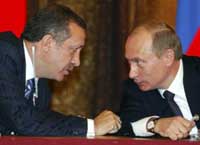Whatever consequences might ensue from the election of Abdullah Gul as Turkey's new president, a change of direction in Turkey's relations with Russia is unlikely to be one of them. Since the government, led by the Justice and Development Party (AKP) took office in 2002, Turkey has been drifting eastward -- but not toward the Islamic world. Ankara's disputes with European countries over Turkey's proposed entry into the European Union and with Washington over U.S. policies toward northern Iraq have weakened Turkey's traditional westward orientation. In the east, however, the AKP government has been more eager to cultivate relations with Russia than with Muslim-majority countries. Under the AKP, Turkish-Russian commerce has soared, from $8 billion in 2002 to $25 billion today. Russia has become Turkey's second-largest trading partner, second only to the EU. Factors contributing to this surge include Russia's role as Turkey's major energy supplier, the millions of Russian tourists who visit Turkey annually, and the extensive involvement of Turkish contractors in the Russian economy, especially in the construction sector. Turkish businesses have already begun pursuing opportunities related to Russia's preparation for the 2014 Winter Olympics in Sochi.
Turkey Drifts Eastward, Toward a Strategic Alliance With Russia

